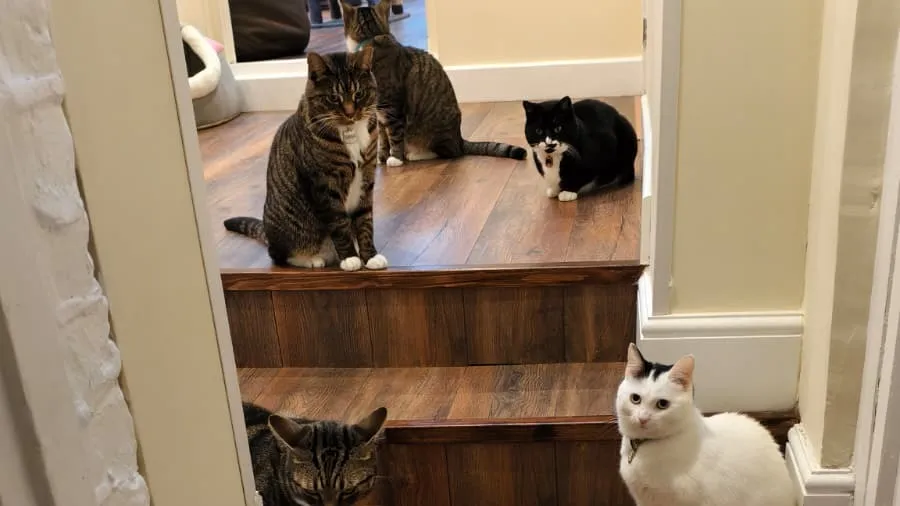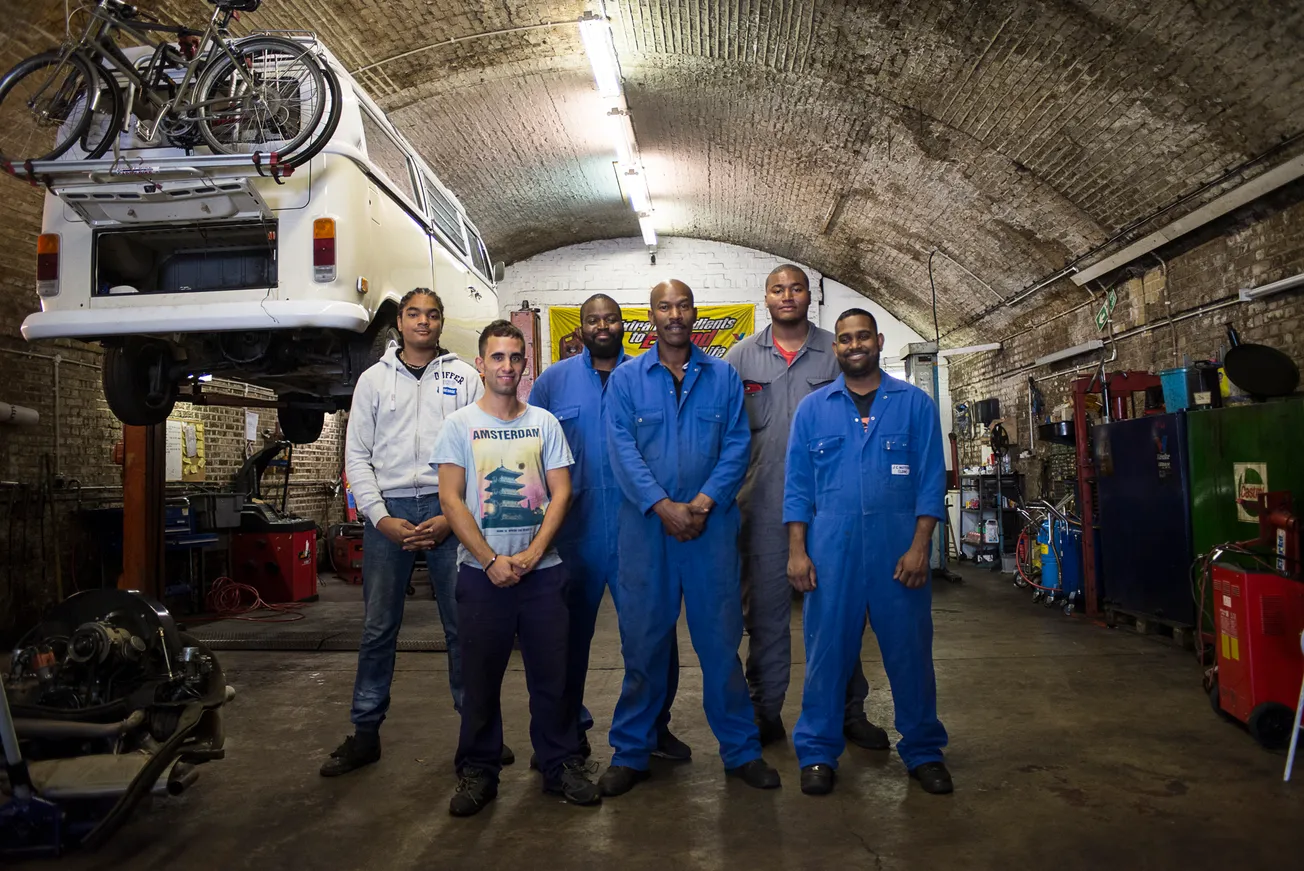To read today's piece, you’ll need to be a full-fledged paying member. At the beginning of November, we set the lofty target of reaching 1,100 paid members by the end of the month. We’re now 37 paid members away from hitting that goal. Can you help? Not only will you get access to all of the amazing pieces in our archive: whoever number 1,100 is will also get a shout-out in our next newsletter.
We've made it easy too: with our new member discount, a Londoner membership is just £1.25 a week. If you like what we're doing, please consider supporting us.
With its minimalist hand-painted sign, portico entrance and floor-to-ceiling windows, La Maison du Chat looked like any other bougie Pimlico coffee shop. Opened by former Shell oil executive Florence Heath in the middle of the pandemic, it served continental breakfasts and avocado on toast, its cake stands were stacked with scones, macarons and finger sandwiches. But La Maison had one unique selling point: the tearoom doubled as a home for rescue cats imported from Tunisia and Cyprus, who would occasionally try to dip their paws in your coffee.
But less than two years later in December 2022, La Maison closed for good. This followed months of problems: in February, after a visit from Westminster council, Heath was forced to remove the cats due to concerns that “gaps in the floor could lead to cat faeces making its way into the yoga studio downstairs”. She also hadn’t obtained the correct licence for animal training or exhibition — when an initial inspection was carried out in October 2020 (two months before its official launch), refurbishments were still underway, so one couldn’t be granted — meaning the business ran illegally for nine months. After the cats were speedily rehomed, Heath continued to serve customers with a “SORRY, NO CATS FOR MEOW #savesmallbusiness” notice on the door. By the time La Maison closed down in December 2022, the owner had racked up £45,000 debt.
La Maison isn’t the only recent fatality of London’s cat cafe scene. The first in the UK, Lady Dinah’s Cat Emporium — founded by Lauren Pears in Bethnal Green in 2014 — shuttered this year after their rent was backdated. Its closure coincides with the business model coming under intense scrutiny. In March, the RSPCA and Cats Protection jointly pleaded for cat cafes to be “phased out” as they believe it’s "almost impossible" for these environments to meet the welfare needs of the animals. After all, cats, descended from their territorial, solitary wild counterparts, are famously antisocial.

Originating in Taipei in 1998, cat cafes have been popular in urban East Asia for decades, but are a relatively new import to the UK. The number in England has risen by 44% in the past year, with other unlicensed businesses like Heath’s possibly in operation — especially as local authorities have been scrambling to set down regulations in pace with demand for licences. Many aren’t even sure themselves what’s needed: “Lauren helped the council figure out which license was required,” Freyja, 31, the former manager at Lady Dinah’s, says proudly when we speak over the phone. “But from what I know the licensing is very council to council.” Though by no means registered charities, many cat cafes angle themselves as pseudo-adoption centres, taking in animals from shelters or facilitating their rehoming. They also usually have rules dictating when and how customers are allowed to interact with their resident moggies, though how closely they adhere to them depends on staff.
But while they’re growing around the country, the phenomenon seems to be in decline in the capital. Compared to 28 elsewhere in the UK, just four out of a peak of six London cat cafes remain open: Holloway Road’s Whiskers & Cream, St John’s Hill’s Cat-titude and two branches of Java Whiskers, a Swedish-owned company with sites in White City and Marylebone. When I visit the latter, minutes away from Oxford Circus, I twice walk past the building, barely visible beneath scaffolding. Inside, it’s indistinguishable from a dimly lit chain like Starbucks or Cafe Nero, except for a glass partition separating the coffee shop from a windowless room containing the felines. A framed sketch of John Lennon and his black cat Mimi hangs on the wall. A chalkboard sign boasts 873 adoptions and counting.

The five young staff on shift are initially reluctant to talk to me in case they “get in trouble”, though I find out that all have been working for Java Whiskers for less than eight months. The supervisor present tells me that there are currently “not very many” cats, putting the number at 11, though this depends on how many have been adopted recently. They are sourced from shelters the Scratching Post, who also worked with Lady Dinah’s, and Furry Ears Rescue, who also supplied La Maison du Chat with strays from Mediterranean countries. (Some shelters are reluctant to work with cat cafes due to the stress of “secondary rehoming”, says Freyja.) Explosive fights between mogs are rare, but ruffian cats are removed because “it’s no good for them or each other,” the supervisor insists. When I ask how many bookings they have each day, a staff member estimates between 70 and 300.
Such numbers are unsurprising, given their location and the fact that all of London’s cat cafes lease their space for events: birthday parties, corporate get-togethers, product launches and bridal and baby showers. Java Whiskers’ Westfield site, nestled in a concrete-paved square in the middle of the shopping centre, is currently home to 17 adult cats and 11 kittens. The two age groups kept in separate, glass-panelled rooms visible through the shopfront as kittens, the manager explains, have “a weaker immune system”. (An employee at another cat cafe who wishes to remain anonymous claims this is untrue, and isolated kittens “won’t grow into strong cats”.) From outside, I see that the adult room is completely empty of all humans, including staff, the cats tiptoeing around each other. The kitten room, meanwhile, is at capacity. Group bookings are frequent. Do they ever have to give rowdy customers the boot? “So many times,” the manager says, embarrassed. “Though we do have an age limit.”
Notably, all Java Whiskers staff I speak with are in their early twenties. For multiple staff split across cat care and hospitality, including the Westfield manager who has worked for the company for three years, this is their first job. (At Lady Dinah’s and Whiskers & Cream, staff are often working towards an animal care qualification.) Anonymous employee reviews of Java Whiskers online allege problems ranging from understaffing, being paid minimum wage, eleven-hour shifts and lack of a tipping system to “manic power tripping managers”, “a culture of favourism and bullying” and postponing medical care and feeding to prioritise customers. One review reads: “There’s a general vibe that management don’t care about the staff and all the decisions are based on money rather than the cats’ welfare.”
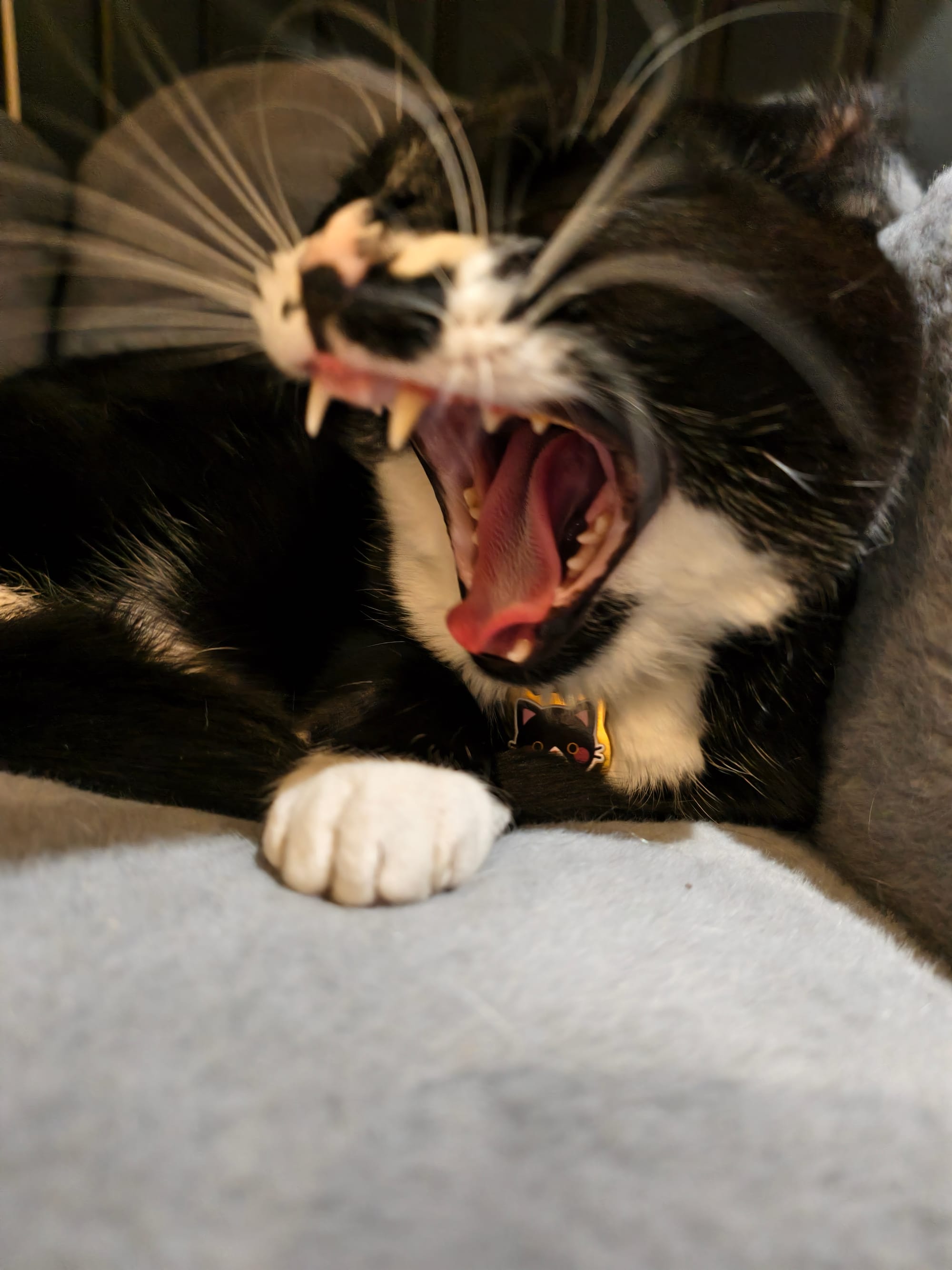
An emphasis on profit over welfare was something Yoanna at Cat-titude, who was made redundant in the TV industry before founding her business, says she was keen to avoid. “I also didn't think that the whole process was fair on the cats themselves,” she recalls. Like Whiskers & Cream’s cats, Yoanna’s coterie of eight were “severely neglected”, sourced directly from owners and are not up for adoption. On Java Whiskers’s rehoming process, she says, “if [a] person adopted based on a 15-minute interaction, that cat can potentially go back into a shelter very soon. They're habitual animals, and they like security and stability.” She says Cat-titude is one of only five cat cafes worldwide to have a garden, which she and her brother cat-proofed. “[Some of the cats] have never seen the garden before they came here. This is the kind of change that makes it a lot less commercial and corporate and profitable and whatever you want to call it, and just takes the focus onto the animals and how they feel.”
In London, where rents and running costs are soaring, securing suitable premises can prove a challenge, especially when landlords are averse to cat cafes. An ideal venue offers human-free areas for cats to relax and to ease new cats into the environment, vertical space for climbing, doors preventing escape and separate cat, litter and food preparation zones. Though it is rare for cats to be friendly with unrelated members of the same species, scope to get them used to each other is limited. “Our office was also kind of like our isolation area,” says Freyja, who is currently gearing up to reopen Lady Dinah’s with help from an “angel donor”. “There was a lot of space in the cafe. That meant we could kind of separate them and keep them in the cafe and they'd be okay.” This space is essential for quarantining and treating cats during illness. Cat flu is fairly common, the supervisor at Java Whiskers tells me, and where cases are more extreme, cats “go home with a member of staff”.
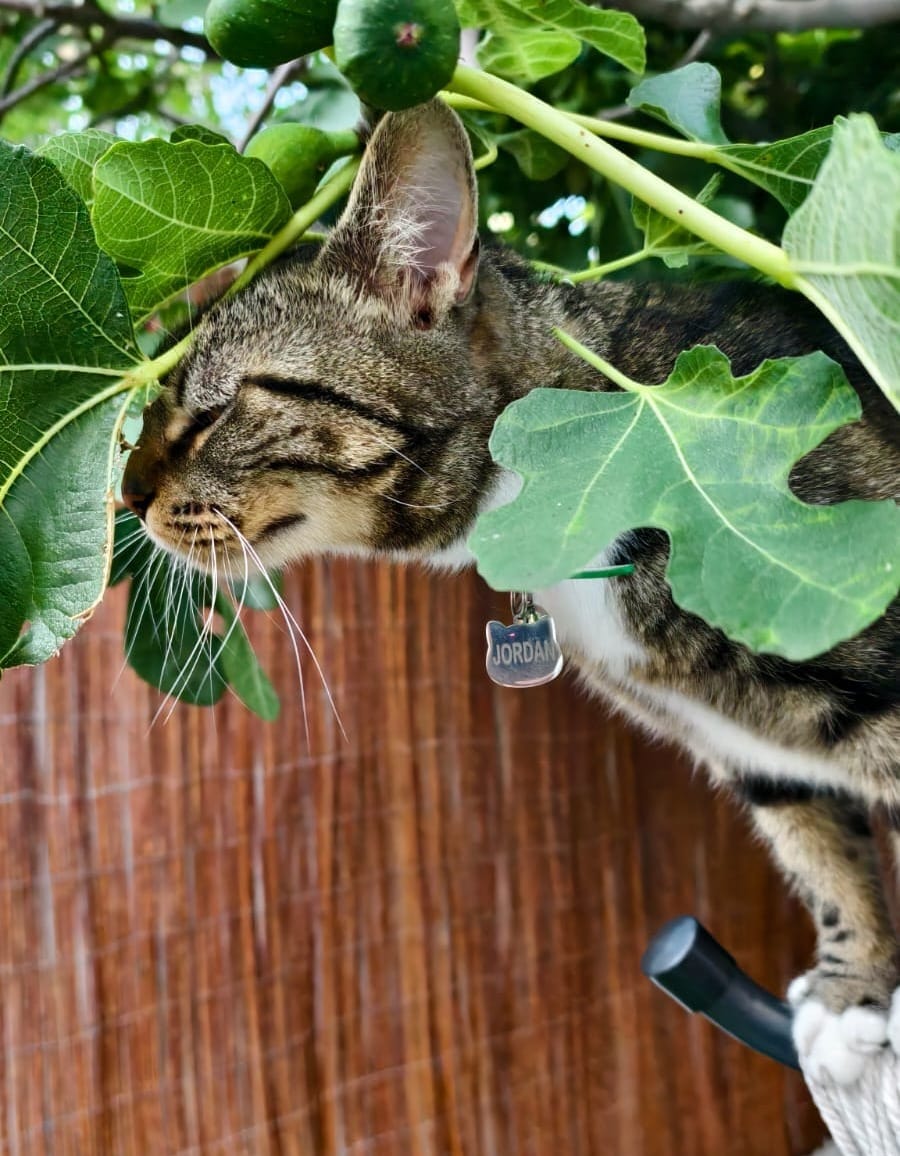
At Whiskers & Cream, a compact, white-walled cafe with a large window facing onto Holloway Road, I meet co-founder and manager Jasmine. She is half-Japanese, she says, and the cafe was inspired by Shibuya’s litany of animal cafes. She tells me new members don’t always fit in: a since-retired tabby “was “really grumpy and became mean and horrible”, while another wide-eyed black cat called Winnie was “rejected” by the rest. Nevertheless, their portraits still hang on the wall. The cafe’s eight cats — permanent tenants — were found on Gumtree, often neglected by former owners and needing medical treatment on arrival.
On this Thursday afternoon, most of the tribe are sleeping peacefully, minus Ollie, the youngest, who swipes angrily at the glass pane separating him from the kitchen. But they have much worse to contend with than each other. “Some kids will grab a cat,” she tells me, as she points towards a dozy Maine Coon called Jasper. And when the cafe opened in 2019, “someone broke in with a sledgehammer” to steal its safe, though all cats miraculously stayed put. Their large window, facing onto the busy street, continues to be a hazard: “When people bang on our windows it scares Ollie.”
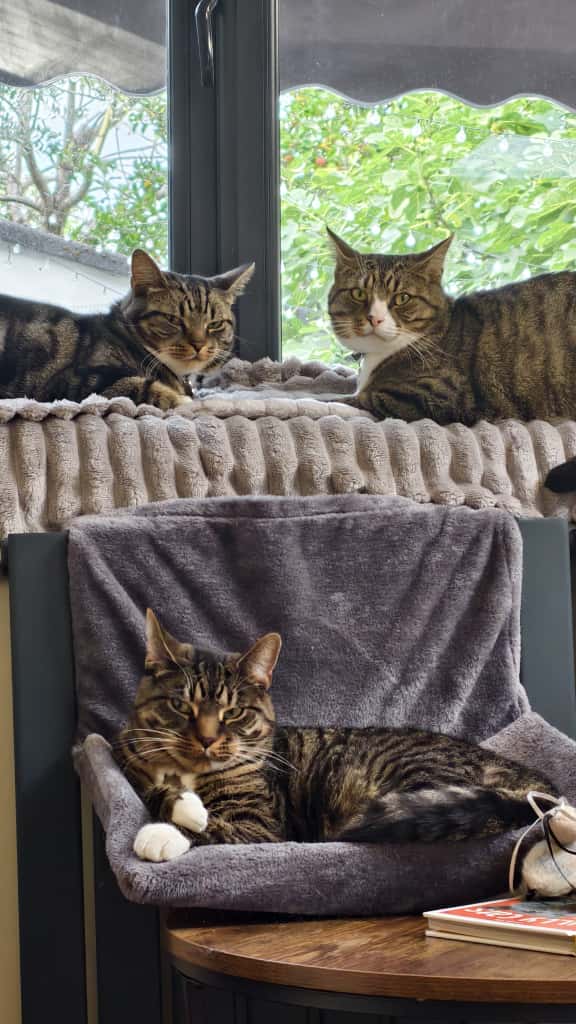
As Lady Dinah’s sets to re-open imminently, whether more businesses in this mould will overcome high running costs and rent to open remains to be seen. It’s clear that most shopfloor staff care deeply about the cats — “I would take a bullet for them,” says Jasmine — but how well-equipped each is to meet their needs is another question. “It's really good for cats that are very sociable, because they can socialise with other cats very freely,” says Freyja. “They get so much play time… The story we get a lot would be that owners didn't want their cat to end up in a crate in a rescue centre.”


